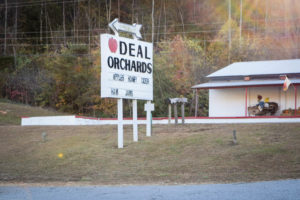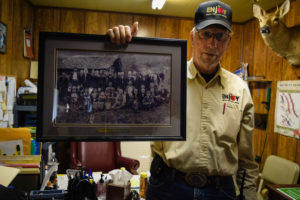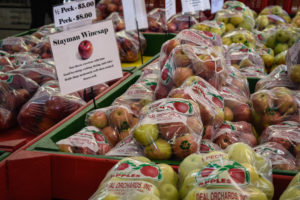Lindsey Deal emerged from a swung-open wooden door behind the cash register in the same way Deal Orchards appeared from the road. Driving along Highway 64, the storefront for the orchard looked like a white tin warehouse, named for, perhaps, the bargain-priced produce inside. In reality, it was for the man whose family had founded and run the business for generations, carried on still today. The cashier, busy ringing up boxes of apples, apple butter, apple cider, and old-fashioned candies, called Lindsey on her flip phone to answer a few questions on the business; and there he came, extending a long tree-branch arm beckoning into his office.
Lindsey Deal is a human torch of North Carolina apple country. A tall man with grey hair and beard, Lindsey wore black baseball cap and khaki button down, both branded by the “Enjoy North Carolina Apples” insignia, the “O” of “Enjoy” a bright red fruit. His accent was certainly Southern, a characteristic of his Taylorsville community though occasionally too thick for Northern ears. He was curi ous about how Northern eyes saw his little piece of North Carolina, prioritizing a good impression of a place he clearly took pride in. In fact, Taylorsville had been, he said, the capital of the American apple industry for decades, which his great-grandfather had a hand in.
ous about how Northern eyes saw his little piece of North Carolina, prioritizing a good impression of a place he clearly took pride in. In fact, Taylorsville had been, he said, the capital of the American apple industry for decades, which his great-grandfather had a hand in.
Ready and eager to embark on a thorough history of NC apple country, Lindsey relaxed into his leather desk chair, hands laced together across his belly. His personality was strewn across the wood-paneled walls of his office. From the NRA sign on the back of his office door, to the two elk heads mounted on the wall, to the mosaic of family photos–his children, grandchildren, and ancestors who he introduces–a presumably conservative, Southern persona emerges. Yet throughout his explanations of the culture of his region, his face lit up with enthusiasm. According to Lindsey, this county used to be the moonshine capital of the country, connecting to the popularity of NASCAR in the community. He claims that NASCAR stems from moonshiners “pumping” up their cars to escape the law during Prohibition. Through his stories, Lindsey’s character slowly evolved into a richly diverse man both of traditionalism and understanding.
While the Deals originate from Kentucky, the Deal family has been harvesting apples in the county surrounding Taylorsville for well over 100 years. As Lindsey regaled the history of Deal Orchard, he rose from his chair to point to the largest frame on the wall. Inside is a black-and-white photograph capturing three rows of men, most of whom were dressed in their Sunday best–as Lindsey points out, some of whom wore farmer’s overalls, and two of whom sported bushy white beards. The entire scene, set outside on an agricultural property, looked like it could have been torn from a Civil War history book. One of the two white-bearded men, however, was Lindsey’s great-grandfather–the original Deal’s Apples. The photo is of the first North Carolina Apple Growers’ Association, a group established to align NC apple farmers to compete and cooperate with larger wholesale produce markets. While Lindsey’s great-grandfather chose to partake in this industry, his brother (Lindsey’s great-uncle) chose to start a hardware store. Many will recognize it today as Lowe’s Home Improvement. Now onto the sixth-generation of apple Deal’s, Lindsey’s daughter left her job working numbers at Lowe’s to help run Deal’s Orchard with Lindsey’s other son.
out, some of whom wore farmer’s overalls, and two of whom sported bushy white beards. The entire scene, set outside on an agricultural property, looked like it could have been torn from a Civil War history book. One of the two white-bearded men, however, was Lindsey’s great-grandfather–the original Deal’s Apples. The photo is of the first North Carolina Apple Growers’ Association, a group established to align NC apple farmers to compete and cooperate with larger wholesale produce markets. While Lindsey’s great-grandfather chose to partake in this industry, his brother (Lindsey’s great-uncle) chose to start a hardware store. Many will recognize it today as Lowe’s Home Improvement. Now onto the sixth-generation of apple Deal’s, Lindsey’s daughter left her job working numbers at Lowe’s to help run Deal’s Orchard with Lindsey’s other son.
At Deal Orchard’s Lindsey sells about 80,000 bushels of apples per year. The very units used for apple sales has evolved over the years, he says, in correspondence to changing gender norms. According to Lindsey, the apple industry began selling half bushels because a bushel box was too heavy for women–who did all the shopping–to carry. When women went back to work, however, they stopped buying apples in such large increments altogether. Lindsey said that women will full-time jobs were more likely to buy groceries for the night or a week, too busy to make pies or other more elaborate dinner measures apple-related extras in addition to employment. From this, the industry developed the “peck,” an even smaller increment of apples. While describing how feminism altered the apple industry, Lindsey remained a neutral tone, not condescending to a movement that altered his family’s practices. Rather, he was empathetic overall, if not overtly supportive–employing a level of respect that created interest amongst his NRA poster and elk heads.
As a well-established apple man, many beginning farmers come to Lindsey to ask advice to begin an orchard of their own. Lindsey laughs to himself when this happens, knowing how they underestimate the “hard parts” of farming. To establish an orchard, one must purchase land, equipment costing upwards of $6,000, and seeds to plant the trees. From there, farmers have to wait at least six years for the trees to grow for any return on their investment. He tries to pass on some wisdom, of course. For example, Lindsey has his orchards scattered across Taylorsville rather than in one area, so if there is a storm, not every orchard is impacted. One hailstorm can knock out a farm for 18 months, Lindsey said; when there’s bad weather, most people don’t even think about how this affects the farmers.
To continue constructing a behind-the-scenes look at the farming process-and to build the empathy of the farmer’s life–Lindsey provided a tour through his refrigeration units and warehouse. The massive refrigerator, full of innumerable wooden crates, smells crisp and sweet like ice-cold cider. There is actually cider in the fridge, which is outsourced for production due to strict health standards but made from Deal apples. Lindsey said, while he would like to, it is impossible to grow organic fruit in the East. There’s too much rain, which promotes fungus and rot without chemicals. Deal Orchards are, however, GAP (Good Agriculture Practices) certified.
He proceeded to walk through the entire apple-sorting process, from the conveyer belts, to turning on the washing mechanisms, to showing how each moving process worked–how apples were sorted by hand and through machine into high and low quality piles. He pointed to a 30-foot stack of boxes, with High Quality and Low Quality written in different colors. Years back, Lindsey’s customers would switch apples from high and low quality boxes in attempt to pay the lower price, so Lindsey color-coded the boxes so he wouldn’t be swindled.
Finally he approached a box of small red-green apples, the size of which make them most appealing  to deer hunters. These were Bushy Mountain Limbertwigs– native to the region and the very apple that his great-grandfather grew to found Deal Orchards. He picked up one apple and offered a bite to anyone with “good teeth.” The consistency was firm, difficult to chew, but flavorfully balanced between tart and sweet. He took another apple and placed it on the ground, proceeding to step and place his entire weight on it. Then he picked up the apple again to reveal that there were no dents or bruises.
to deer hunters. These were Bushy Mountain Limbertwigs– native to the region and the very apple that his great-grandfather grew to found Deal Orchards. He picked up one apple and offered a bite to anyone with “good teeth.” The consistency was firm, difficult to chew, but flavorfully balanced between tart and sweet. He took another apple and placed it on the ground, proceeding to step and place his entire weight on it. Then he picked up the apple again to reveal that there were no dents or bruises.
The day with Lindsey concluded with one last question: What was his favorite apple? He answered that if he was ever out in the orchard–after all the customers had come and gotten their pick–and he saw one last Golden Delicious, he would climb to the top of a tree to get it.
From there he returned inside to his office, encouraging a car ride through the orchards, just off to the west. Lindsey Deal tucked himself away as quickly as he had shown himself; he was a representation of the apple country in the nicest way: a man of history, tradition entwined with progression, and a Southern hospitality that opened and welcomed an eye into Taylorsville, North Carolina.
